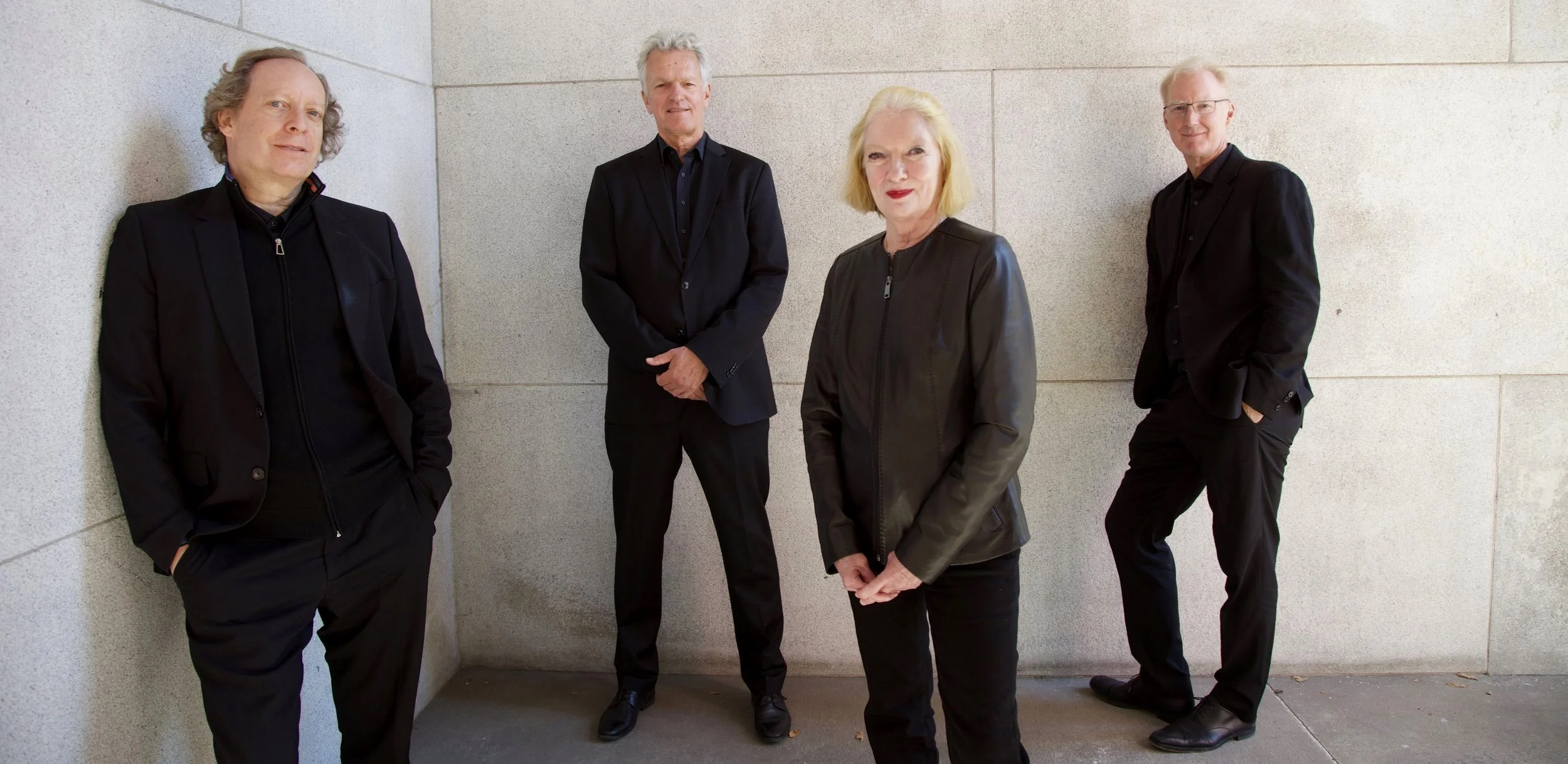Martin Foster and Laurie Carney, violins
Robert Becker, viola
David Geber, cello
The American String Quartet was a winner of the 1974 Naumburg Chamber Music Award. Formed when the original members were students at Juilliard, the ASQ was also named the winner of the Coleman competition that same year.
Early Press Acclaim
"great depth and vibrance...musical understanding and virtuosic technical accord rare at any age.." - Los Angeles Times
"... brilliant... with young musicians like these, the future of American Chamber Music is in remarkably talented hands..." - Pasadena Star News
"The American String Quartet plays with unbelievable maturity, while adding that dash of liveliness which should give an exciting new slant to American chamber music in the years to come." - Denver Post
Naumburg Concert, March 25, 1975, Alice Tully Hall, Lincoln Center
American String Quartet, 1974 Chamber Music Award
Martin Foster and Laurie Carney, violins; Robert Becker, viola; David Geber, cello
Program
Bartok: Third String Quartet
Ravel: Quartet in F Major
Elliott Carter: Quartet No. 1 (1951)
Review Excerpt, The New York Times, March 1975
American String Quartet is Prized
"The American String Quartet, tender-aged but already solidly professional...the quartet's choice of program announced that it meant to be taken at the highest level of seriousness...the playing had fire and virtuosity, collectively and individually..another first-class young quartet seems to have been born." - Donal Henahan
As part of their Naumburg prize the American String Quartet was awarded a commission by Claus Adam String Quartet (1975). The work received its world premiere at the Aspen Music Festival, summer 1975. The ASQ recorded the work in April 1983 and the recording was released on the CRI label.
Composer note by Claus Adam
"The String Quartet '75 is actually my second quartet, while the first was an earlier attempt performed by the Juilliard String Quartet in 1949 for ISCM long before I had become the cellist of the Ensemble. The work is clearly organized into two parts. the first part begins with a Lento tranquillo, shifts into an Allegro inquieto in free sonata form, then transitions into a Largo doloroso - forming a large emotional arc.
The second part employing scordatura - an alternate tuning technique, unusual for modern compositions, where strings are "mistuned." (Scordatura was commonly used in the 17th and 18th centuries. Other examples can be found in the music of Biber, Tartini, Bach, Paganini and Mahler, in Kodaly's solo cello sonata.)
In the Moderato statico=presto misterioso, pizzicatos and natural harmonics are employed but fingered without ever pressing the string down to the fingerboard. Melodic and harmonic materials from the first part are repeated and developed in the second part.
In the last section Veloce e vivace which is almost a perpetual motion at times, all the devices of the previous sections are employed plus fingering or pressing the strings down to the fingerboard to get various pitches."
Today, internationally recognized as one of the world's finest quartets, the American String Quartet has spent decades honing the luxurious sound for which it is famous. The Quartet celebrated its 45th anniversary in 2019, and, in its years of touring, has performed in all fifty states and has appeared in the most important concert halls worldwide. The group’s presentations of the complete quartets of Beethoven, Schubert, Schoenberg, Bartók, and Mozart have won widespread critical acclaim, and their MusicMasters Complete Mozart String Quartets, performed on a matched quartet set of instruments by Stradivarius, are widely considered to have set the standard for this repertoire.
Recent seasons featured performances of the Quartet’s major project together with the National Book Award-winning author Phil Klay and the poet Tom Sleigh, which offers a groundbreaking program combining music and readings that examines the effects of war. The Quartet also collaborated with the renowned author Salman Rushdie in a work for narrator and quartet by the film composer Paul Cantelon built around Rushdie’s novel The Enchantress of Florence. These tremendously imaginative collaborations cement the American String Quartet’s reputation as one of the most adventurous and fearless string quartets performing today, as comfortable with the groundbreaking as with the traditional.
The Quartet's diverse activities have also included numerous international radio and television broadcasts, including a recent recording for the BBC; tours of Asia; and performances with the New York City Ballet, the Montreal Symphony, and the Philadelphia Orchestra. Recent highlights include performances of an all-sextet program with Roberto and Andrès Díaz, many tours of South America, and performances of the complete Beethoven cycle of string quartets at the Cervantes Festival in Mexico and the Tel Aviv Museum in Israel.
The American’s additional extensive discography can be heard on the Albany, CRI, MusicMasters, Musical Heritage Society, Nonesuch, and RCA labels. Most recently the group released "Schubert's Echo," which pairs Schubert's monumental last quartet with works bearing its influence by Second Viennese masters Alban Berg and Anton Webern. This repertoire posits that the creative line from the First to the Second Viennese Schools is continuous – and evident when these works are heard in the context of each other.
As champions of new music, the American has given numerous premieres, including George Tsontakis’s Quartet No. 7.5, “Maverick,” Richard Danielpour's Quartet No. 4, and Curt Cacioppo's a distant voice calling. The premiere of Robert Sirota’s American Pilgrimage was performed around the U.S. in the cities the work celebrates. The Quartet premiered Tobias Picker’s String Quartet No. 2 in New York City in celebration of the 90th anniversary of the Manhattan School of Music.
Resident quartet at the Aspen Music Festival since 1974 and at the Manhattan School of Music in New York since 1984, the American has also served as resident quartet at the Taos School of Music, the Peabody Conservatory, and the Van Cliburn International Piano Competition.

1974 Chamber Music Competition
First Prize
Claus Adam: Quartet “1975”